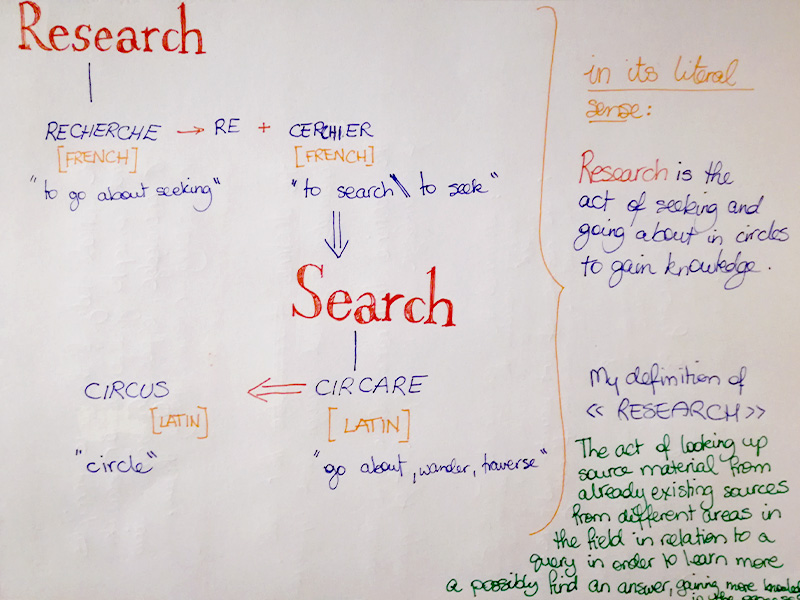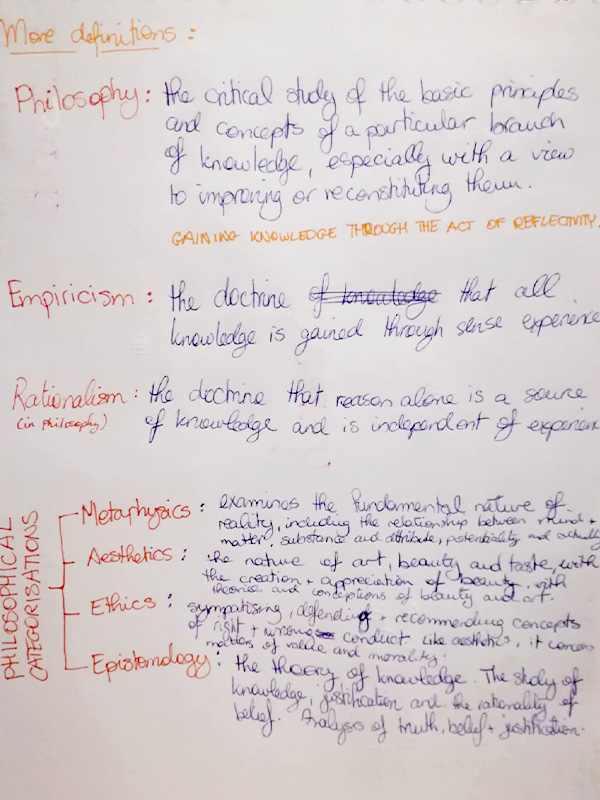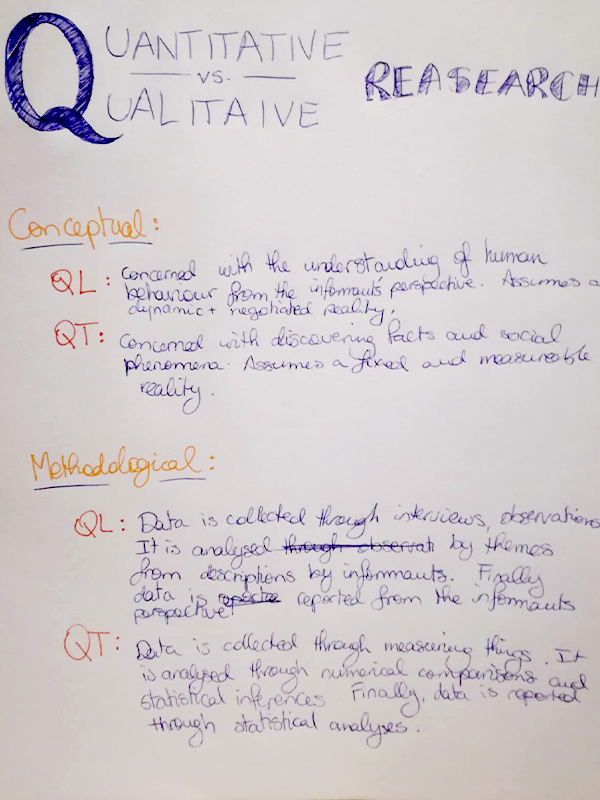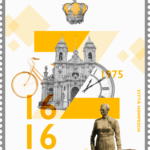
Research and Theory: Methodologies, Management, Catalysts, Theories and Fiction

What Does Research Mean?
Research is derived from the French word recherche which means “to go about seeking”, which is in turn made up of the French word cerchier, meaning “to search” with the added prefix re. In relation to this, word search is derived from the Latin word circare, meaning “to go about, wader, traverse” which in return brings about the root of this word – circus, meaning “circle”. Therefore, the literal meaning of the word research can be described as “the act of seeking and going about in circles to gain knowledge”.

This week’s lecture is about research methodologies. How does one go about processing the information and experiences in order to learn from them. The idea of research is to change the balance of power between the overwhelming power jumbled information and complex jargon to breaking it down into smaller parts that are easier to comprehend. Henceforth, a research methodology is the way we approach and process this complex information. It is the learning process.
Following Hosken’s exercise, my description of the term research would be, “The act of looking up source material from already existing sources from different areas in the field in relation to a query in order to learn more and possibly find an answer, gaining more knowledge in the process.” Hosken continues to explain how research methodologies have evolved over time. The concept of research has gone beyond the confines of a laboratory. Nowadays, one can find the idea of praxis – theories in practice, arts and based engagements and other forms of research that are conducted to learn more about various aspects of human nature.
Curiosity – a Creative and Scientific Trigger
Research is primarily triggered by curiosity. It is through curiosity which knowledge is gained. Some consider research as a science, others as an art and even some see it as a craft. In parallel to this, some consider research as something academic, whilst others as a part of life. Personally, I think there are two forms of research; the for formal one where a specific procedure is taken, data collection, conducting of interviews etc. That is what I consider the academic side of research. However, we are really researching things constantly, it could be a plane ticket for a holiday, or even what movie should we watch next. Which one is the cheaper? Which is the one that is worth watching? Also, I think that research can be classified as a craft, even if scientific methods can be applied. A good researcher is able to apply the best practices and customise them as it is fitting depending on the question that needs to be answered.
Looking at research and research methodologies from a historical aspect, one must look at the nature of Philosophy. Philosophy is the way how knowledge is arrived at and how knowledge is categorised through the act of reflectivity. Also, it is the critical study of the basic principles and concepts of a particular branch of knowledge, with a view to improving or reconstituting them. Back in Ancient Greece, Rationalists and Empiricists had contrasting opinions about how one gained knowledge. Rationalists firmly believed that reason was the key to knowledge. Without a prior set of first principles and inate concepts that we are born with, we cannot interpret what happens around us. We would be left with a cloud of meaningless sensations. However, Empiricists argued that all knowledge is gained through sense experience. What we experience is what gives us knowledge. Our perception starts the processing of information.
Modern-day Philosophy, Research Methods and Methodologies
Over the course of time, philosophy has branched out into various areas of thinking, however it is categorised into four major sections, which are:
- Metaphysics: the branch of philosophy that examines the roots of reality, including the relationship between mind and matter, substance and attribute, and potentiality and actuality. It is the area of study that covers Ontology and Cosmology. The area that asks the big questions like ‘Who is God?’, ‘Why are we here?’.
- Aesthetics: the area of study in relation to beauty, art and taste. It looks at the creation and appreciation of beauty. ‘What makes something beautiful?’
- Ethics: the branch of philosophy that sympathises, defends and sometimes recommends concepts of what is considered good and bad conduct. Similar to aesthetics, it concerns matters of value and morality.
- Epistemology: the study of knowledge itself. The theory behind it. It is the study and analysis of how we as humans gain knowledge, how do we justify knowledge and the rationality of belief. Research methods and methodologies also fall under this category.
Method and Methodology and two terms that are often confused and used interchangeably. Whilst they sound similar and are indeed linked to one another, their meanings vary. Methodology is a compound word: Method and ology, meaning “a series of steps” and “knowledge” respectively. Hence Methodology is “a series of steps, or a process taken to answer a question and gaining knowledge in the process”. With this said, the term method would be “the series of steps taken to acquire knowledge”.
Two popular research methods are the Qualitative and Quantitative methods.
In a conceptual sense, Qualitative research is concerned with the understanding of human behaviour from the informant’s perspective. It assumes a dynamic and negotiated reality. On the other hand, quantitative research is more concerned about unearthing facts and social phenomena. Also, quantitative research assumes a fixed and measurable reality.
From a methodological perspective, when conducting qualitative research, data is collected through interviews, observations, diary accounts and open-ended questionnaires. When it comes to analysis, qualitative research is subjective. The interpretation and distillation of data varies on the form of data collection used. In spite of this, qualitative data collection allows the researcher to delve deeper into the subject matter and get better insight from a particular perspective. Finally, the data is usually presented in the for of a written report from the informant’s point of view.
In contrast to the above, looking at quantitative data collection from a methodological perspective, at first glance may seem raw and cold. Quantitative data is normally collected to close-ended questionnaires and surveys. Quantitative data is collected through numbers and categories, which are in turn ranked and constructed into graphs. Whilst quantitative data may be more generic compared to the above, such a research method helps in decoding patterns across different contexts, which in return would help in making comparisons and contrasts between said contexts. In the end, quantitative data results are usually presented in the form of a statistical report.
Research Principles
Whilst research is key for us to gain knowledge, is it important to respect certain principles when conducting research. This would maximise the efficacy of the research process and minimises collateral damage along the way. In the lecture, Hosken brings up 5 points:
- Minimise sense of harm: It is important and the research being conducting does not cause harm to the participants, be it direct or indirect.
- Informed consent: Prior to having participants involved at any stage of your research, it is important to have the participants’ consent to use any of their personal data as well as any of the information that they may provide.
- Protecting anonymity and confidentiality: Ensuring confidentiality to any participants is important, particularly should they ask for it. It could be for personal reasons as well as because of the nature and sensitivity of the information that they will be providing. In many situations, participants are willing to divulge information only if anonymity is guaranteed.
- Avoid deception: Participants should not be tricked into being “test subjects” as part of a research.
- Right to withdraw: Participants should be given the right to stop taking part in the research process at any point in time.
With reference to the above mentioned, there is a controversy regarding the deception of participants in a research process. Covert research is a research method were the identity of the researcher, the nature of the research or both are concealed from the participants. The reasons for doing so may vary, however, it is often to protect the identity of the researcher and such research methods are mostly used to gain knowledge regarding sensitive topics that may be of a criminal nature. With that said, the researchers who get involved in such practices may still be held accountable should any damages are incurred.
What Makes a Good Research Question?
Along with curiosity, in order to yield some good results, a research process must start with a good research question. A good research question should be:
- Relevant
- Manageable
- Substantial and Original
- Fit for Assessment
- Simple and Clear
- Interesting
Further to that, good results also come from sourcing the right information. Sources are divided into two major categories:
- Primary: sources that are derived from first-hand experiences, like a diary or vis-à-vis interview. It can also be information derived from statistical data.
- Secondary: sources that are created later through research. Such sources include school textbooks and essays.
As part of a good research process, and also to determine whether the research question is relevant, it is good to have a look at what is already been discovered and written in relation to the question. In a more formal setting, this is put together in a literature review. A literature review is a write-up were the topic in question is discussed and the argument is back-up by already existing sources of information.
Further to the above, when sourcing information it is important to look at whether the source is reliable. The C.R.A.A.P. test is a simple yet very effective checklist to see if the material being sourced is relevant and reliable. C.R.A.A.P. stands for:
- Currency
- Relevance
- Authenticity
- Accuracy
- Purpose
To Conclude
Living in an era were information is flooding from everywhere, it is important to be able to differentiate the reliable from the unreliable. In addition, as tempting as the internet is, moving away from the screen and look for information first-hand, or else going to the library is also a good way to gain better knowledge on various subjects. As it is a platform with very easy access, the internet is filled with trivial information. It is full of fluff and dust bunnies.
When it comes to research methods, us graphic designers can benefit a lot from this. Being able to elicit information from the general public, be it through interviews or statistics, it helps in providing better end-products to our clients. As designers, although it is in our nature to make things aesthetically pleasing, our end goal is to make something that has a function. Understanding what the demand really is will only ensure success in our endeavours.







